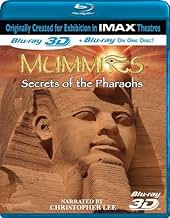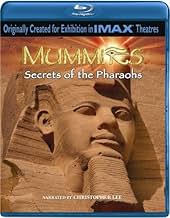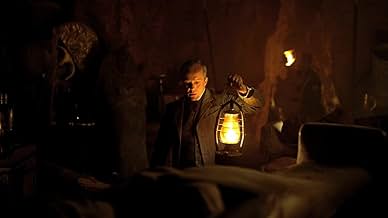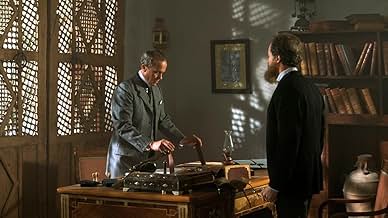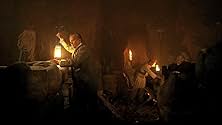The grail is not the gold, nor the books of ancient wisdom, but the 3,000 year old DNA of the mummies, which may lead to a cure for malaria.The grail is not the gold, nor the books of ancient wisdom, but the 3,000 year old DNA of the mummies, which may lead to a cure for malaria.The grail is not the gold, nor the books of ancient wisdom, but the 3,000 year old DNA of the mummies, which may lead to a cure for malaria.
- Awards
- 1 nomination total
Angelique Corthals
- Self
- (as Dr. Angelique Corthals)
Zahi Hawass
- Self
- (as Dr. Zahi Hawass)
Mohamen Mehdi Ouazanni
- Grand Vizier Paser
- (as Mehdi Ouazzani)
Darwin Shaw
- Mohammed Abd El Rassoul
- (as Daud Shah)
- Director
- Writer
- All cast & crew
- Production, box office & more at IMDbPro
Featured reviews
It's an IMAX forty minute short meant for the museum science theaters. Visually, it has some of the epic grand vistas with recreations. It examines the art of mummification and the Egyptian afterlife. I don't care about the modern day mummification scientific experiment. It's not visually interesting and the results could be explained easily. It doesn't actually need those scenes. I'm more intrigued with Egypt locations even if they're recreations. I wouldn't mind if this could show the mummification process in more detail although the medical TV show aspect may be off-putting for little kids in museums. It's a good science short. The IMAX could be used to greater effect.
This feels like a history channel special. There were a few neat IMAX camera shots but not really enough to take advantage of the overly large screen.
There's some basic information about who the mummies most likely were, a view in on an experiment where some scientists make a modern mummy in order to try and figure out where to withdraw DNA from old mummies and some stuff on tomb robbers.
That's basically it. I'd advise seeing it if you're obsessed with mummies but otherwise there isn't too much you can get out of this movie.
There's some basic information about who the mummies most likely were, a view in on an experiment where some scientists make a modern mummy in order to try and figure out where to withdraw DNA from old mummies and some stuff on tomb robbers.
That's basically it. I'd advise seeing it if you're obsessed with mummies but otherwise there isn't too much you can get out of this movie.
Mummies: Secrets of the Pharaohs (2007)
*** (out of 4)
Christopher Lee narrates this documentary, which was originally shown in IMAX theaters. I had to watch it at home but I can imagine how great some of the images must have looked on such a large format. With that said, the story being told here was rather interesting as the documentary takes a look at ancient Egyptian history and the various import discoveries throughout the years. These discovers are of course traced back to tomb robbing, which was a major source of money back in the day. The main focus is on the biggest discovery, which led to various founders of Egypt being discovered.
The other focus of this documentary is on getting DNA from mummies in hopes that one day we can tell what people died of. For the most part I found this to be an entertaining documentary. I watched it with my six-year-old son who loves this subject and he was slightly entertained by it, although he wasn't overly interested in the DNA stuff. There are some nice images of various mummies that have been discovered over the years as well as some nice information of their discovery. Lee certainly does a very good job with the narration with that terrific voice of his.
*** (out of 4)
Christopher Lee narrates this documentary, which was originally shown in IMAX theaters. I had to watch it at home but I can imagine how great some of the images must have looked on such a large format. With that said, the story being told here was rather interesting as the documentary takes a look at ancient Egyptian history and the various import discoveries throughout the years. These discovers are of course traced back to tomb robbing, which was a major source of money back in the day. The main focus is on the biggest discovery, which led to various founders of Egypt being discovered.
The other focus of this documentary is on getting DNA from mummies in hopes that one day we can tell what people died of. For the most part I found this to be an entertaining documentary. I watched it with my six-year-old son who loves this subject and he was slightly entertained by it, although he wasn't overly interested in the DNA stuff. There are some nice images of various mummies that have been discovered over the years as well as some nice information of their discovery. Lee certainly does a very good job with the narration with that terrific voice of his.
This was my first experience with IMAX, as well as with 3D. I'm a few years late, i know.
So, having the experience was the only reason why i went to see this. I was, and still am amazed at the possibilities of the medium. I couldn't know what to expect, though i thought about it several times. What fascinated me was not how "real" the experience is, but how "beyond real" it may become. Cinema lives on enhancing common sensations to degrees in which we react. In cinema, colours bust be highlighted, contrasts as well, well, even drama and narrative dynamics (like in theater). The 3D, associated with the super screen opens new windows to those possibilities, it's a technical possibility that creates a whole vast area of dark places for clever filmmakers to explore. How exciting is that? As a first experience, i recorded to aspects, which i think may be of great interest.
One is the power of a landscape, not because it is enlarged, not because it is "real", but because the right image, edited in the right sequence, can be of a higher impact. Imagine the explosions in Antonioni's Zabriskie Point, with all those points of view, enhanced to the point that they blow your head. I hope the market and film industry will turn to IMAX with enough strenght to make it usable for our "authors" to think specifically for it, to explore the depths of the medium, instead of the superficial effects i imagine have been used so far.
The other aspect is how this medium might revolutionize the relations between space and cinema. How we might rephrase the way we make a film become "spatial" through the way we move around space. I mean, even in a documentary with such mundane footage as this one i watched i felt the power of moving around. Of course here we have the depiction of Egyptian architecture, which lives on mystery, on moving around, and that is highly cinematic. And the film was also thought to produce certain effects associated to its format. But i kept thinking about the possibilities. What would the best filmmakers do with this? Can you imagine what would Orson Welles have done, if he ever had the possibility to shoot for IMAX? Or Hitchcock, or de Palma, who actually is around and still working, who knows.
The documentary in itself, is leveled after the History channel model, with off voices telling facts, footage of the remains of the old civilization, and stagings of old happenings. Mundane, except for the effects thought specially to work on the medium, which were new to me, but which i suspect will be vulgar, as soon as i repeat the experience enough times, with other films.
My opinion: 2/5 http://www.7eyes.wordpress.com
So, having the experience was the only reason why i went to see this. I was, and still am amazed at the possibilities of the medium. I couldn't know what to expect, though i thought about it several times. What fascinated me was not how "real" the experience is, but how "beyond real" it may become. Cinema lives on enhancing common sensations to degrees in which we react. In cinema, colours bust be highlighted, contrasts as well, well, even drama and narrative dynamics (like in theater). The 3D, associated with the super screen opens new windows to those possibilities, it's a technical possibility that creates a whole vast area of dark places for clever filmmakers to explore. How exciting is that? As a first experience, i recorded to aspects, which i think may be of great interest.
One is the power of a landscape, not because it is enlarged, not because it is "real", but because the right image, edited in the right sequence, can be of a higher impact. Imagine the explosions in Antonioni's Zabriskie Point, with all those points of view, enhanced to the point that they blow your head. I hope the market and film industry will turn to IMAX with enough strenght to make it usable for our "authors" to think specifically for it, to explore the depths of the medium, instead of the superficial effects i imagine have been used so far.
The other aspect is how this medium might revolutionize the relations between space and cinema. How we might rephrase the way we make a film become "spatial" through the way we move around space. I mean, even in a documentary with such mundane footage as this one i watched i felt the power of moving around. Of course here we have the depiction of Egyptian architecture, which lives on mystery, on moving around, and that is highly cinematic. And the film was also thought to produce certain effects associated to its format. But i kept thinking about the possibilities. What would the best filmmakers do with this? Can you imagine what would Orson Welles have done, if he ever had the possibility to shoot for IMAX? Or Hitchcock, or de Palma, who actually is around and still working, who knows.
The documentary in itself, is leveled after the History channel model, with off voices telling facts, footage of the remains of the old civilization, and stagings of old happenings. Mundane, except for the effects thought specially to work on the medium, which were new to me, but which i suspect will be vulgar, as soon as i repeat the experience enough times, with other films.
My opinion: 2/5 http://www.7eyes.wordpress.com
Mummies: Secret of the Pharaohs is an exceptional Imax film. The cinematography is beautiful (Egypt in Imax, need I write more?!), the recreations convincing, and most importantly, the film is engrossing. Intertwining three separate but related stories, Mummies: SotP, explores the far and near past in a fresh fashion all the while keeping an eye on their payoff - these separate pasts' unexpected role in advancing our future (no revelations will be made here. It's worth it to see the film!)
Films should be entertaining, that is a given. When they are educational as well...well you just can't help but leave the theater thinking that your dollar went far further than you've come to expect, and that, in my book, is always a reason to recommend a film!
Films should be entertaining, that is a given. When they are educational as well...well you just can't help but leave the theater thinking that your dollar went far further than you've come to expect, and that, in my book, is always a reason to recommend a film!
Details
- Release date
- Country of origin
- Official site
- Language
- Also known as
- Mummies 3-D: Secrets of the Pharaohs
- Filming locations
- Production companies
- See more company credits at IMDbPro
Box office
- Budget
- $4,000,000 (estimated)
- Gross worldwide
- $3,547
- Runtime
- 39m
- Color
- Sound mix
- Aspect ratio
- 1.44 : 1
Contribute to this page
Suggest an edit or add missing content




